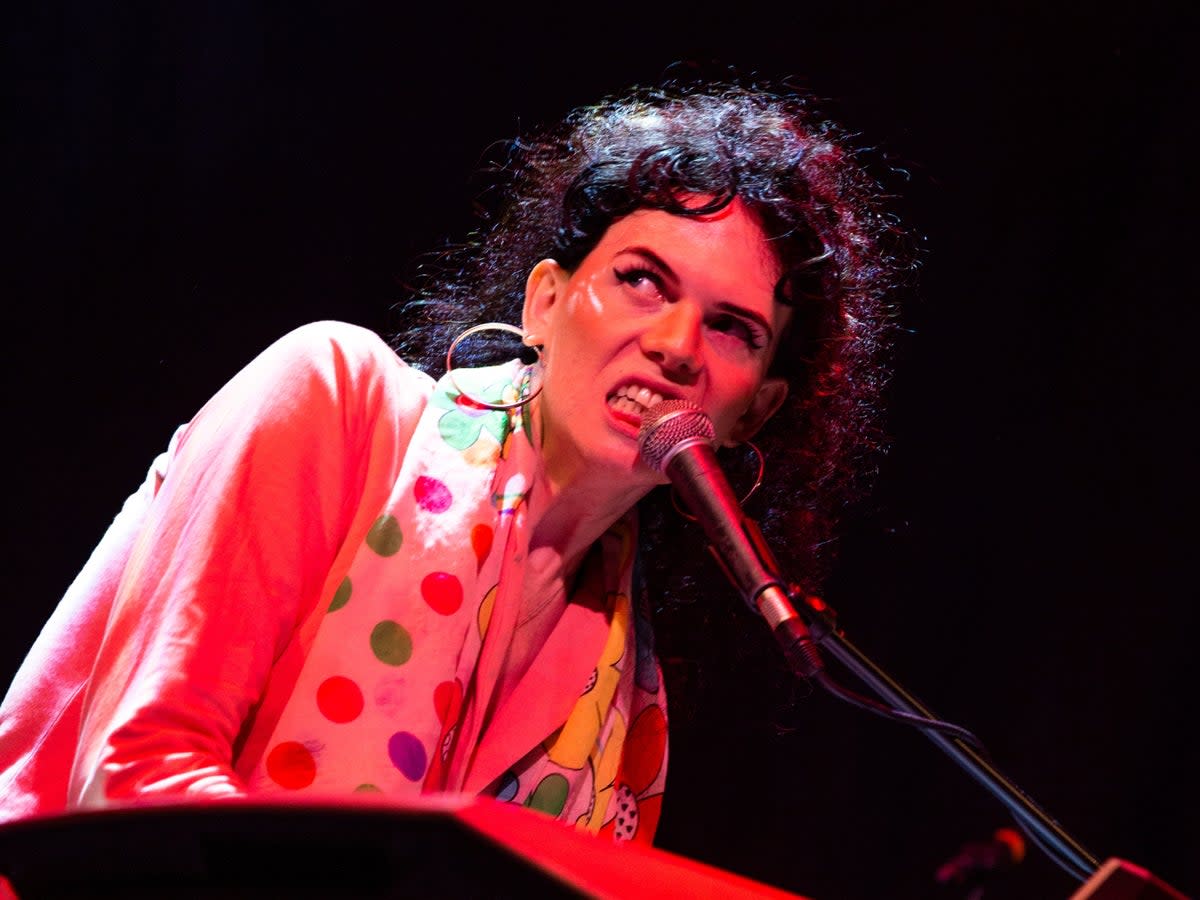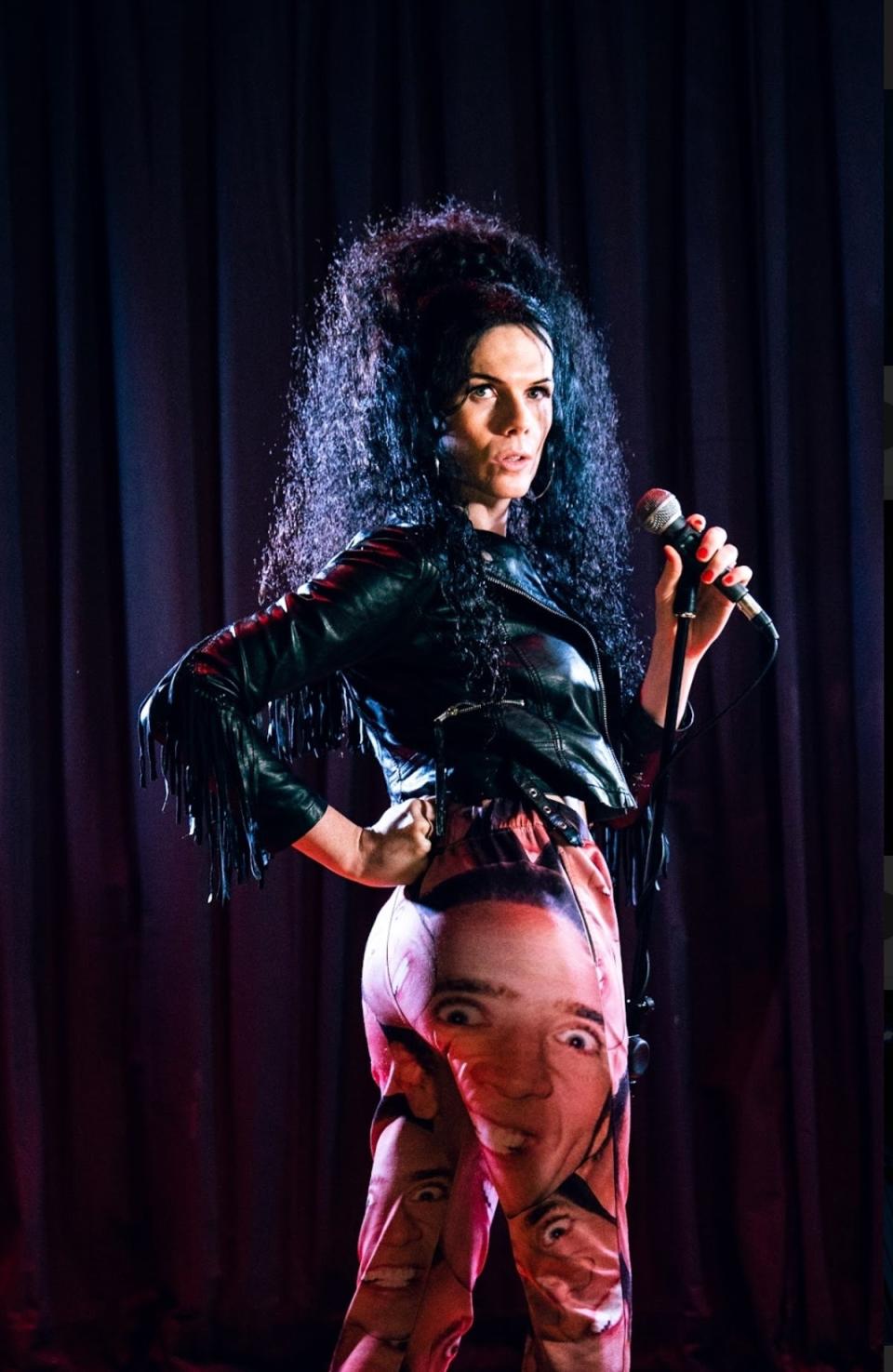Jordan Gray: ‘A handful of death threats is a lot for a week. Spread ‘em out!’

This sounds so stupid, but just bear with me.” Jordan Gray is telling me about that time she got naked live on Channel 4 a few weeks ago, as part of Ben Elton’s Friday Night Live. It turns out her original plan was even more dramatic: the transgender comedian had wanted to wear a suit made of magician’s cotton that would go up in flames before revealing her naked body. “You put this special aerogel on your skin so you don’t burn but you still stay really hot,” she says, matter of factly. “I’d have to do it and then jump into an ice bath straight away so I didn’t keep burning.” Health and safety, unsurprisingly, got in the way. “I got a really sweet email from Channel 4 two weeks before, like, ‘We love you Jordan, we’re really interested in whatever you’re doing. Please don’t set yourself on fire live on TV.’”
Bold ideas like these are what makes Gray unique as a stand-up. The 33-year-old’s Edinburgh Fringe hour, Is it a Bird?, also ended with a birthday suit moment, which made it one of the most talked-about tickets of the festival. The show – which Gray has just performed at the London Palladium and will take to the Soho Theatre in December – also saw Gray tear through topics, from her right to occupy “women-only spaces” (for example, the candles section at TK Maxx) to how Mr Potato Head got co-opted by the culture wars.
It was also a great chance for the comedian to show off, all while shouting about how “f***ing talented” she is, with a huge vocal range and a real knack for improvising on the keyboard. Is It A Bird? won five-star reviews across the board, an Edinburgh Comedy Award nomination and the title of Comedian’s Comedian. Her celebrity admirers include Ian McKellen, Jennifer Saunders and Harry Potter star Jason Isaacs, the latter of whom has staunchly defended Gray against transphobic trolling.
The show’s title has a double meaning: it references Gray’s obsession with superheroes, but also the way people back in her hometown of Essex refer to her gender. Its climax combines both themes, with Gray diving into a telephone box and emerging completely naked: breasts, penis and all. It was funny, but also profound, with the nude Gray ending the show hunched over her keyboard, singing the words: “If I’m gonna be a joke then I might as well be in on it.” When Channel 4 invited her to take part in their 40th birthday celebrations in October, Gray knew she’d replicate her show’s most powerful moment. After she hammered out her song “Better Than You” on the keyboard, Gray’s pink suit was yanked away (using an impressive pulley system of fish wire and magnets), to reveal her nude body. The live audience loved it and Gray cried happy tears in the car on her way home.
Then, “like on a bad mushroom trip”, the negativity began to seep in. “Jordan Gray” trended on Twitter. People called for her arrest. She was dropped as the patron of an educational charity. Ofcom investigated, then later dismissed, 1,400 complaints made against her. As part of her performance, she’d sung: “I’m just better than you/ And in a way I always knew/ I’m such a f***ing genius/ You don’t have a f***ing clue” (an “obvious hyperbole” for comic effect, she clarifies), and half the country seemed to agree with her. The other half? They thought she was morally reprehensible.
Given we’re speaking only two days after the Ofcom verdict, Gray seems sanguine about the whole thing. She wears a navy Henley shirt and baggy trousers; her long, curly hair nestles under a baseball hat with a brain on the front. A silver necklace around her neck looks like a standard pendant, but on closer inspection actually depicts a penis and testicles.
The last month has been defined by extreme highs and lows, but Gray decided to just go with it. “I think I’m a nice person, but I don’t know for sure,” she says. “But if it turns out I am nice, things will probably work out. And they have worked out. I’m gonna take that as evidence that I’m at least not a terrible, terrible person.” She pauses. “But a handful of death threats is a lot of death threats for a week. Spread ‘em out! I’ll take it over a decade… but not a week. That’s a lot for someone to have to deal with.”
Gray speaks softly but readily, often going on long tangents to proffer quotes and pieces of trivia. Her wide knowledge can be heard in her new podcast, Transplaining, where she and her celebrity guests attempt to answer one big and one small question about the state of the world, ranging from “How do we get people to care about the end of the world?” to “Who did let the dogs out?”. In case the brain on her cap didn’t give it away, Gray really values her smarts. “If somebody called me stupid, I’d take that really personally,” she says. “Apart from that, everything is fine, but if somebody was to go after my intelligence, I’d really, sincerely think I might get upset.”
Growing up, her intelligence was all Gray had – because “obviously I was not popular, I wasn’t cool, I couldn’t kick a football”. Well, that and music. A professional singer from the age of 16, Gray performed in death metal and acoustic bands and released seven solo albums, ranging from classical to rap, powered by an obsession with “being the best at every single genre”. In 2016, she appeared on The Voice, where she got her first shot at fame, and reached the semi-finals. She made audiences laugh but also – predictably – was on the receiving end of transphobia on social media. “Half the viewers would say, ‘She’s amazing’ and half would say, ‘He’s awful’,” Gray recalls. (Deliberate misgendering was part of the abuse.) “There was no crossover, no ‘he’s amazing’ or ‘she’s terrible’. It makes you think that talent’s got absolutely nothing to do with it.”
After the show ended, Gray released one “rubbish” first single (her words) that charted at 114 then gave up music completely. Having worked as a cleaner in a casino for two months, she decided to have a crack at comedy. Gray planned to keep music separate, not realising at the time how her talents could complement each other. By the time she came to create Is It A Bird?, her sonorous voice and deft piano skills felt like a cool party trick – albeit one she’d been mastering for a decade.
In her stand-up show, Gray’s climatic naked reveal is a shock – but she’s spent an hour laying the groundwork. It’s a pay-off that’s, unsurprisingly, more difficult to land after just four minutes on live TV. But Gray’s bold denouement has been the topic of lively debate since the Fringe. The aim, she says, has always been to demystify and desexualise the trans body. Despite the volatile “debate” around the trans community, she got naked and the world didn’t explode. “For most people, body means everything: head, shoulders, knees and toes,” Gray explains. “A transgender person, the body means penis, vagina, it just means genitals.” Is there ever a worry that, in stripping off, she’s encouraging that intrusive fascination with what’s between trans people’s legs? “It’s a really interesting thing to dissect,” she says. It’s not like she’s stripping on stage as means of fetishising herself; she’s simply taking her clothes off. “If it was titillation, that’s a different thing,” she says. “You have to project a lot of your own sexuality onto that for it to be sexualised.”

The post-Friday Night Live criticism was initially hard to deal with but reinforced Gray’s philosophy that you won’t change anyone’s mind by shouting. In a piece for The Independent Voices earlier in this month, she wrote that, while she wasn’t a “dangerous threat to your kids”, her critics weren’t “out of touch, pearl-clutching maniacs” either.
She was talking about “the huge swathes of feminists that have spent their entire life doing incredible work for feminism, and now feel like I’ve come in and –” Gray’s eyes dart around as she searches for a simile. “It’s like getting into The Walking Dead [in] season three when it gets good, and telling everyone you’re the best Walking Dead fan. I understand. It’s not fair, I get that.” Many of the trolls had branded the routine “misogynistic”, pointing to the lyrics where Gray sung that she was the “perfect woman” because she “used to be a man”, as if her subsequent shout of “sexism!” didn’t make it clear enough that she was joking. They misunderstood it, Gray says, but “I’m not going to go in and be like, ‘You didn’t understand, you’re wrong, you’re scared.’ That’s just an insult to people. They’re angry and when you get angry, you don’t necessarily represent yourself very well.”
Gray doesn’t mind being on the receiving end of the “poison”, if someone has to be – but she hopes her trolls “don’t feel like they should ever repeat that behaviour with somebody else. Maybe having seen the Ofcom result, [they’ll] go, ‘Maybe I went a little bit too far calling her a maniac and a sex criminal. Because it turns out it was fine’.”
For now, Gray is happy to be “the friendly face of transgenderism”, able to direct audiences towards “all the nuanced transgender people that you’ve ignored thus far”. “I’ve stepped out of my lane, because I want to talk to more people, and the trade-off for that is that you do get backlash”. Anyway, perhaps none of this really matters. “We’re all gonna die one day,” she explains, remarkably chipper. “It feels like I’m doing a nice thing, as a bonus. I’ve hopefully added value to society, and then I’m going to die. That’s nice. What more could anyone ask for in this world?”
Jordan Gray’s ‘Is It A Bird?’ returns to Soho Theatre from 13 to 23 December. ‘Transplaining’ is out now

